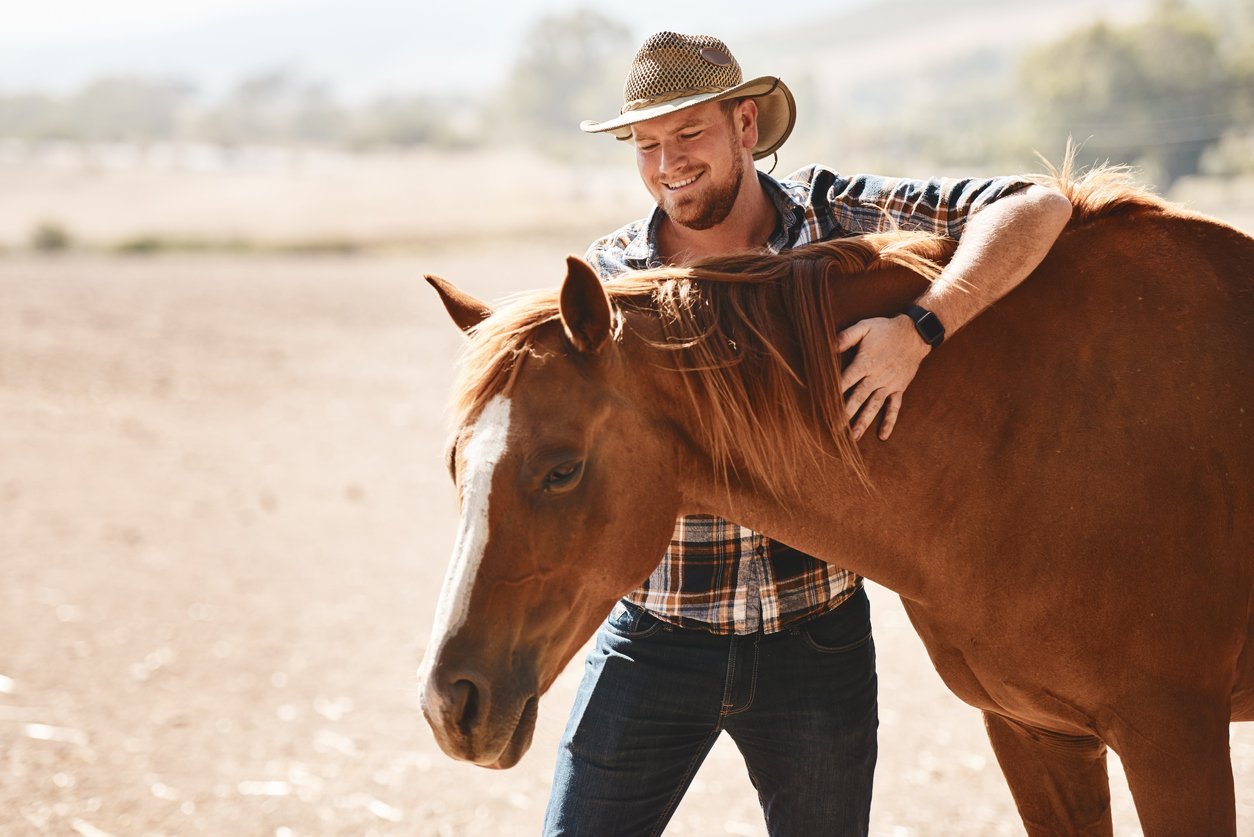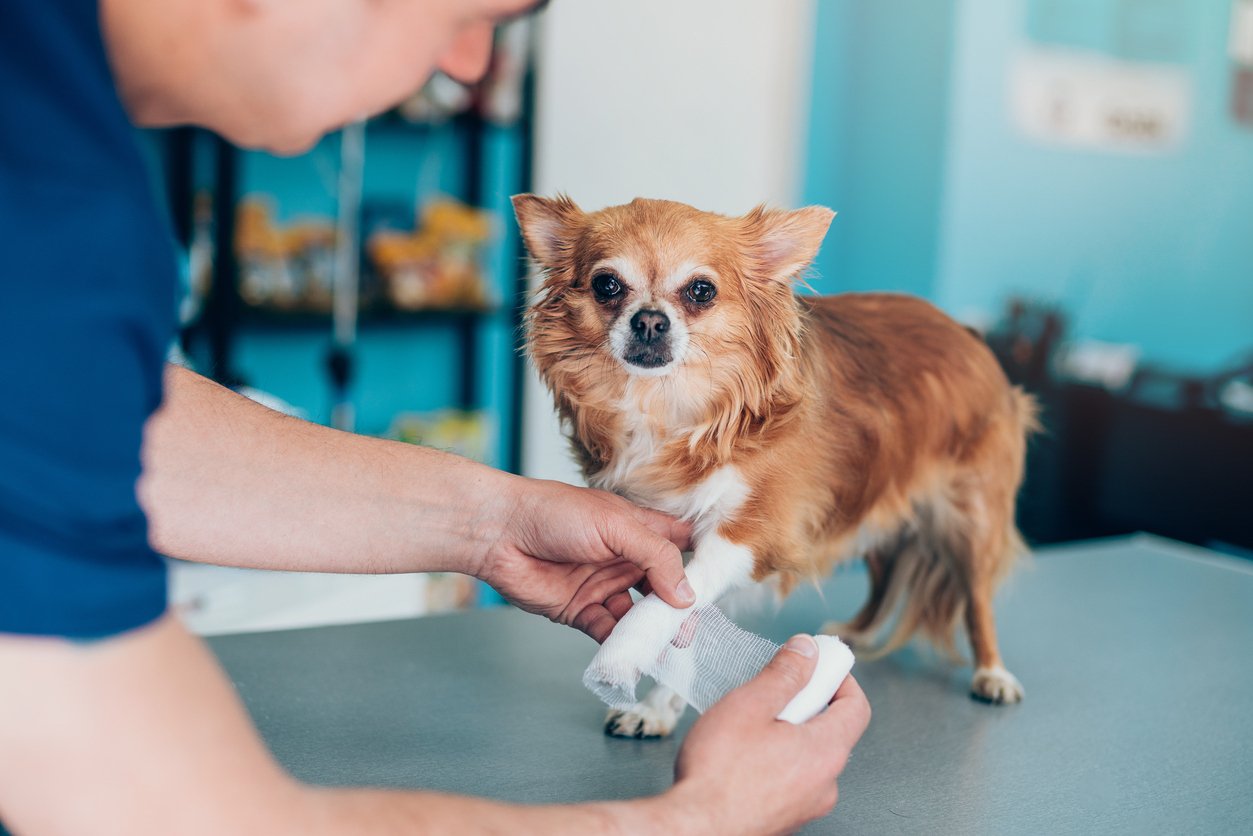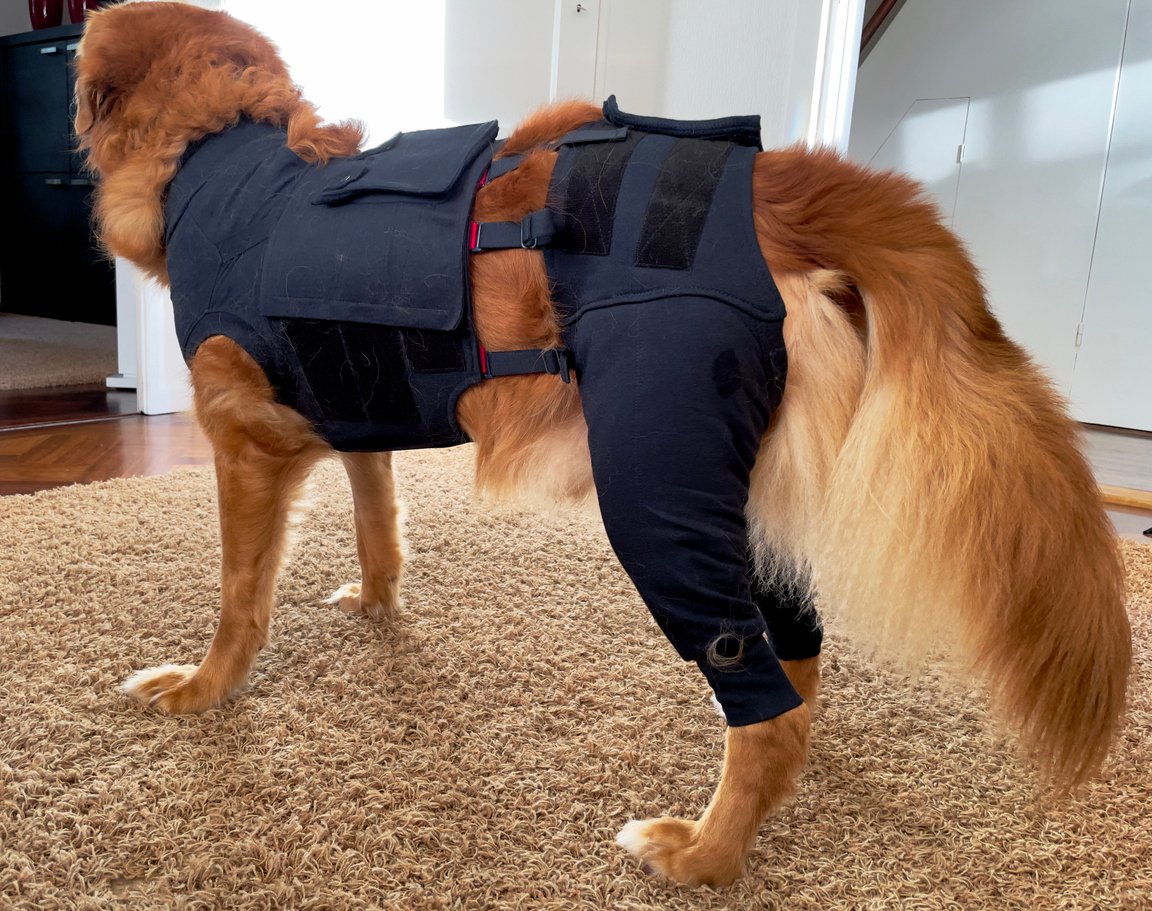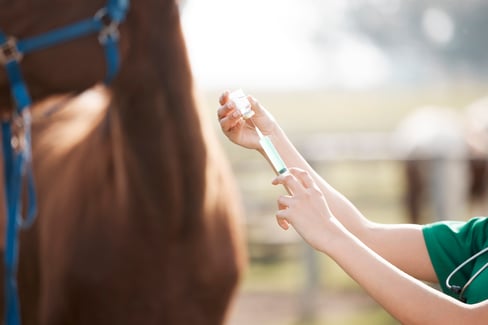Table of Contents
Ever heard the saying “Hay is for horses?”
Well, H.A. is for horses, too.
While you may not have heard of this little-discussed substance before, hyaluronic acid (H.A.) is vital to maintaining the health of your horse.
Without enough of this nutrient, your horse’s joints may not function properly. Your horse can feel stiff, slow-to-move, and may even develop conditions like arthritis.
Definitely not what you want for your domestic or performance horse!
But don’t be spooked.
We’ve got plenty of information about hyaluronic acid for horses below, including the benefits of hyaluronic acid and common horse joint conditions.
And we’ll also discuss the best hyaluronic acid supplements for your horse.
So you can navigate through all the fuss and accomplish what’s important: maximizing your horse’s health.
Keep reading to get up to speed on this vital nutrient. You and your horse will be off to the races in no time!
What is Hyaluronic Acid for Horses?
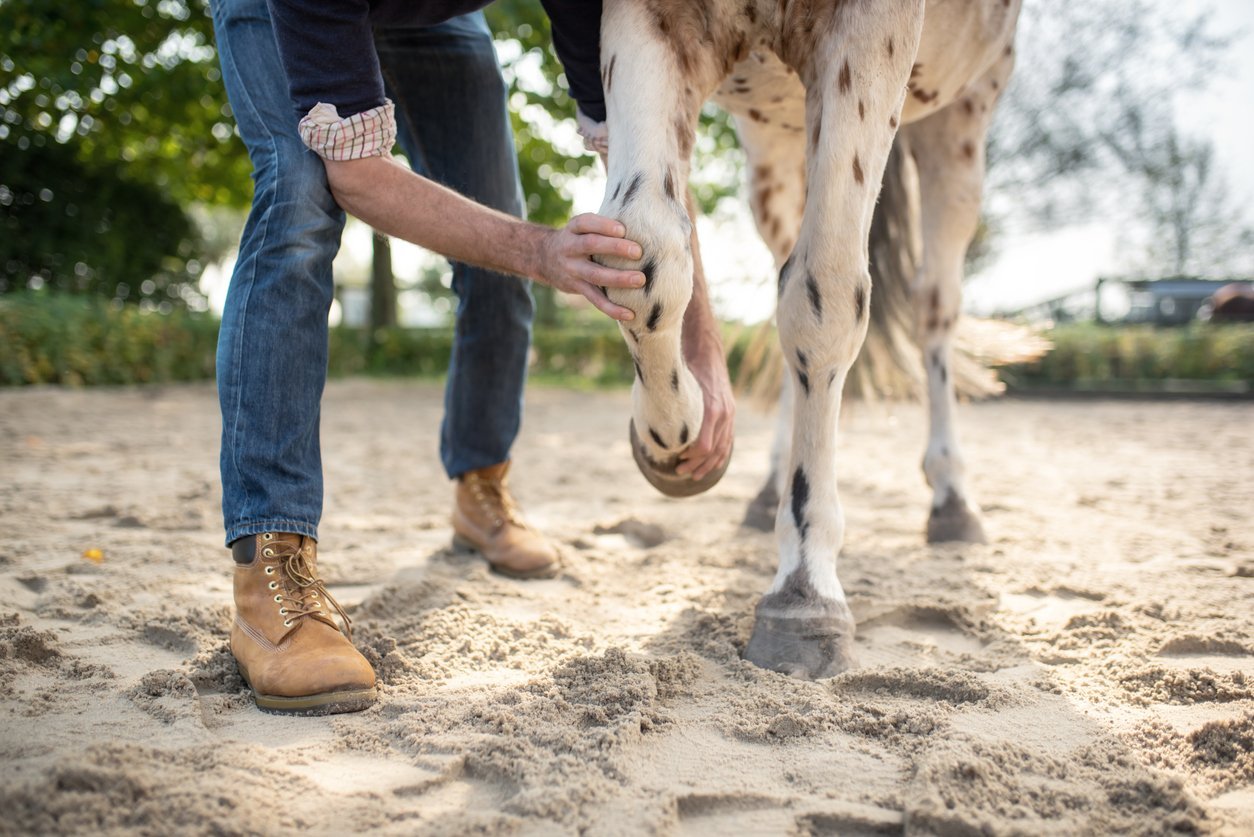
Before we can get into defining hyaluronic acid, we first need to provide a brief refresher on your horse’s synovial joints, which is one of the places hyaluronic acid is found.
Synovial joints are the most common joints in your horse’s body and are found in places where two bones meet, such as in your horse’s front legs. Each of these bones has cartilage on the end to help cushion the bone and provide friction-free movement.
And these joints have another equally important substance: synovial fluid.
Synovial joint capsules contain synovial fluid, which helps lubricate your horse’s joints and allows him to move without pain and stiffness.
So where does the hyaluronic acid come in?
Hyaluronic acid (also known as hyaluronan) is an incredibly important compound found in synovial fluid.
This substance retains water to help keep your horse’s joints lubricated, creating a thin coating on the joint capsule.
But we can’t stop there.
Hyaluronic acid for horses plays other vital roles in maintaining your horse’s health. We’ve listed some of those other places you can find hyaluronic acid in the chart below.
| Body Part | What Hyaluronic Acid Does |
| Joints |
|
| Skin |
|
| Connective tissues |
|
| Eyes |
|
Benefits of Hyaluronic Acid
Having a sufficient amount of hyaluronic acid improves the amount and viscosity of synovial fluid available to your horse.
This provides lubrication to reduce friction in your horse’s joints.
And why is that important?
Because less friction means less wear and tear on cartilage, so your horse can keep performing at max capacity without fear of getting arthritis or another degenerative joint condition.
So you can see why having enough hyaluronic acid is especially important for active horses.
The long and short of it is that hyaluronic acid helps maintain your horse’s health by:
- Lubricating joints
- Reducing pain and inflammation
- Providing powerful antioxidants
Getting impatient for more information?
Hold your horses. We’re about to talk about each of these points in more detail below.
How Does Hyaluronic Acid Improve Equine Joint Health?

Now that you have a basic understanding of synovial joints, it’s time to learn more about exactly how hyaluronic acid for horses can help improve equine joint health.
Lubricates Joints
We’ve said it before.
But we really can’t say it enough: synovial fluid, which has hyaluronic acid as a primary “ingredient,” lubricates your horse’s joints.
And properly lubricated joints help your horse by:
- Reducing friction in joints
- Maintaining fluid and healthy motion
- Absorbing shock
Over time, too much friction in your horse’s joints can lead to health issues like osteoarthritis. This occurs when the cartilage in your horse’s joints begins to wear away.
In other words, your horse’s movement becomes less fluid. He may begin experiencing stiffness, pain, and inflammation while doing his day-to-day activities. Trotting over poles in the arena and playing with paddock-mates soon becomes painful – poor thing!
Fortunately, if your horse has arthritis, hyaluronic acid for horses can help manage the side effects of this condition (though arthritis can never be fully cured).
Additionally, lubricated joints help your horse’s body absorb the shock experienced from jumping, running, and cantering.
And absorbing shock from movement has benefits beyond just your horse’s joints.
When your horse’s joints are properly lubricated, shock is more evenly distributed through his body. This helps promote the health of tendons and ligaments because there is less stress being placed on these connective tissues.
Pretty cool, huh?
Reduces Pain and Inflammation
Remember us talking about the lubrication properties of hyaluronic acid for horses?
(You better, since we just finished doing so!)
Well, properly lubricated joints also help reduce inflammation in your horse’s body.
And less inflammation = less pain.
This is because inflammation can be caused by too much friction in your horse’s joints.
So when your horse’s body is producing or receiving enough hyaluronic acid, you reduce the likelihood that your horse will experience too much wear and tear on his joints.
If your horse isn’t getting enough hyaluronic acid, he might experience more pain and inflammation than is good for him. This is especially true for active horses, so you should do your research and learn how to maintain your sport horse’s performance.
Additionally, joint injuries can actually cause your horse’s body to produce less of this naturally occurring substance.
What does that mean?
Your horse’s injury could be exacerbated.
It’s a vicious cycle. Too little hyaluronic acid may make your horse more prone to injury. The injury then leads your horse to produce too little hyaluronic acid.
This is why it’s a good idea to consider supplementation if your horse has recently experienced a physical setback. We’ll talk more about hyaluronic acid supplements soon!
Provides Powerful Antioxidant Properties
And the third way hyaluronic acid for horses can benefit your equine pal?
Hyaluronic acid has powerful antioxidant properties. This means that H.A. can reduce oxidative stress on horse’s cells.
Sounds complicated.
But it’s not. Let us explain.
As part of normal metabolic processes in your horse’s body, like respiration, things called free radicals are released.
These free radicals create inflammation in your horse’s body.
But the good news is that antioxidants “neutralize” free radicals, thereby reducing inflammation.
Hyaluronic acid is one such naturally occurring substance that has antioxidant properties and can thus help neutralize these free radicals.
So, simply put, hyaluronic acid helps reduce the deterioration in your horse’s joints that’s caused by oxidative stress.
And this oxidative stress happens naturally as horses age.
So hyaluronic acid may be especially helpful for older horses who have undergone more stress in their body over the years.
Top 3 Hyaluronic Acid Supplements for Domestic Horses
With so many on the market, it can be difficult figuring out how to choose the right horse supplement for your domestic horse’s needs. We want to make things a little easier for you, so we’ve listed our top three hyaluronic acid supplements for domestic horse picks below.
1. Integricare TRI-ACTA H.A. for Equine
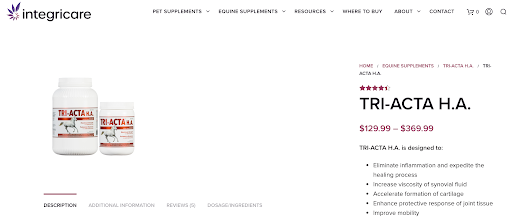
TRI-ACTA H.A. for Equine is the maximum strength version of its sister product, TRI-ACTA for Equine.
This supplement is great for horses that are:
- Competing
- Aging
- Have arthritis
And you want to know what makes this supplement so great?
It’s filler-free, meaning everything in the supplement is an active ingredient. In fact, TRI-ACTA H.A. for Equine is the highest all-active ingredient formula on the market.
More specifically, every serving has 145 mg of hyaluronic acid for horses. So you can rest easy knowing your horse has plenty of H.A. to keep those joints lubricated.
In addition to hyaluronic acid, our supplement contains other active ingredients that are vital to promoting equine joint health. On top of that, TRI-ACTA products are third-party batch tested and are designated to be a Low-Risk Veterinary Health Product (LRVHP), meaning the contents are regulated and verified by Health Canada.
The table below outlines these ingredients and their benefits.
| Active Ingredient | Benefit |
| Glucosamine | Repairs damaged cartilage |
| Chondroitin | Prevents cartilage deterioration |
| MSM | Serves as a powerful antioxidant |
And with our affordable prices, TRI-ACTA H.A. for Equine naturally takes first place in our supplement line-up.
Price $129.99 to $369.99 as of August 2021
2. AniMed Absolute HA
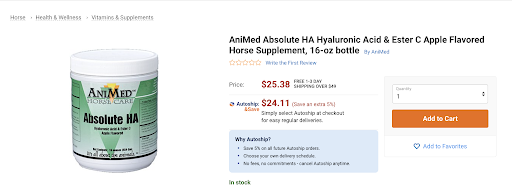
AniMed Absolute HA is a simple, no-nonsense supplement that’s great for all you bargain hunters.
This supplement may be appropriate for aging horses or horses who have arthritis. At 125mg of hyaluronic acid for horses per serving, your horse will receive a great level of hyaluronic acid for the price point.
But keep in mind that there are also other active ingredients that promote joint health.
If you’ve read any of our other blog posts, you’ve heard us talk about the importance of glucosamine, chondroitin, and MSM.
Well, this supplement only contains hyaluronic acid and calcium ascorbate as its active ingredients.
So this may be a great option if your horse is already in great health and your sole focus is on supplementing his hyaluronic acid intake.
But if you’re looking for a more holistic approach (and thus more active ingredients) one of the other options on this list may better meet your horse’s needs.
Price $25.38 as of August 2021
3. Vita Flex Equinyl Joint Supplement with Hyaluronic Acid
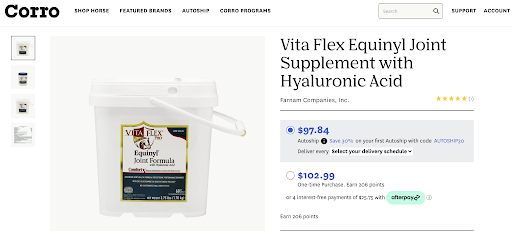
With about 30 mg of hyaluronic acid per serving Vita Flex Equinyl Joint Supplement with Hyaluronic Acid is a great option if you’re looking for just a little bit of hyaluronic acid to supplement your horse’s diet.
This supplement contains other active ingredients that are great for your horse’s joints, including MSM and glucosamine.
But while it contains those active ingredients, it also has some fillers, such as alfalfa meals.
And we’ve discussed elsewhere on our blog how important it is to have as many active ingredients in a supplement as possible.
The fact that this supplement contains other important active ingredients for joint health puts it on our radar as a great supplement.
But its lower levels of hyaluronic acid for horses, especially at this price point, keep it solidly in third place.
Price: $53.19 to $102.99 as of August 2021
Top 3 Hyaluronic Acid Supplements for Sport Horses
Incorporating an equine supplement during training can be a great way to improve your horse’s performance. Below we’ll discuss our top three hyaluronic acid supplement recommendations for your sport horse.
1. Integricare TRI-ACTA H.A. for Equine
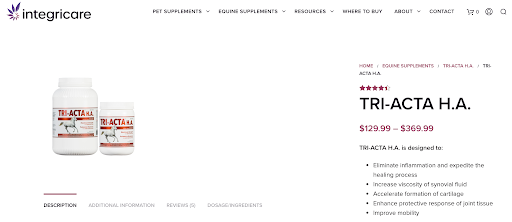
Yeah, yeah, we know. We’ve already mentioned this supplement.
But we just can’t help but be a bit self-promotional when it comes to talking about our awesome product.
We’ve already mentioned that TRI-ACTA H.A. for Equine is a great option for horses that are competing.
And its 145 mg of hyaluronic acid per serving helps keep your active horse’s joints lubricated.
But you know what else? Not only does it contain the active ingredients we discussed before. We also use two types of glucosamine:
- Glucosamine sulfate
- Glucosamine hydrochloride
Why is this so important?
Because glucosamine sulfate is a key building block of cartilage.
And glucosamine hydrochloride is highly bioavailable, which means your horse’s body can more readily use this type of glucosamine.
With everything we just discussed, it’s no wonder we think so highly of our product!
Price $129.99 to $369.99 as of August 2021
2. Grand Meadows Grand HA
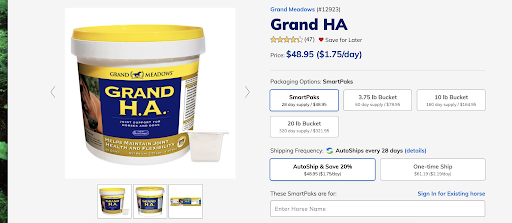
Grand Meadow Grand H.A. is another great hyaluronic acid for horses supplement option.
This product boasts that it’s the first HA product with 300 mg per serving, so it really packs a punch!
In addition to hyaluronic acid, Grand Meadows Grand H.A. contains Biocell Collagen II. This active ingredient helps your horse’s body absorb the chondroitin and hyaluronic acid also present in this supplement.
And this type of collagen also helps promote joint health because it closely mimics the collagen your horse’s body naturally produces.
But the reason it takes second place?
Grand Meadows Grand H.A. has a high level of inactive ingredients, and thus the cost per serving is higher.
Price $48.95 to $321.95 as of August 2021
3. Finish Line Fluid Action HA
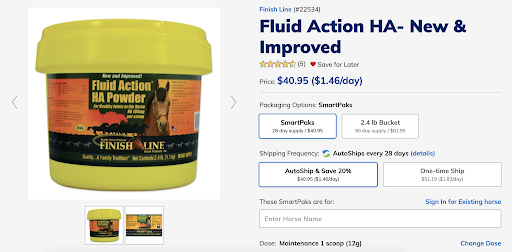
And last but not least, we’ll discuss Finish Line Fluid Action H.A. as another great supplement option for your sport horse.
This supplement contains glucosamine, chondroitin, and hyaluronic acid to help keep your horse’s joints healthy.
It also contains Vitamin D, which promotes joint health by helping preserve cartilage and providing anti-inflammatory benefits.
But it’s missing MSM, which is another important antioxidant that helps promote equine joint health.
This product might have most of the required ingredients, but it has a significant amount of inactive ingredients per percentage of serving. And with only 100 mg of hyaluronic acid for horses, we’ve placed it a bit lower in our line-up than the other two listed above.
Price $40.95 to $81.95 as of August 2021
Joint Ailments/Diseases in Horses & Impact on Overall Health
Now that you have a list of our top hyaluronic acid supplement recommendations, we’re going to dive into a few common joint ailments and diseases. Keep in mind that many of the supplements listed above, including TRI-ACTA H.A. for Equine, can help manage the symptoms of these conditions.
Osteoarthritis
With studies estimating that up to 60% of lameness in horses is caused by osteoarthritis, this ailment is nothing to take lightly.
Arthritis is a common joint condition that affects horses of all ages (even though people typically consider it to be an “old horse” condition).
This degenerative joint disease occurs when your horse loses the cartilage that helps cushion his joints. Over time, this causes pain and inflammation.
Some of the symptoms of arthritis are listed below:
- Stiffness, especially in the morning or after periods of rest
- Pain or swelling in joints
- Signs of pain, such as limping or reluctance to be active
If your horse is displaying any of the above signs or symptoms of arthritis, it’s a good idea to take him to your equine vet. She’ll look for signs of pain, swelling, and heat near your horse’s joints.
She may also conduct an MRI to determine if there has been a loss of cartilage or soft tissues around your horse’s joints.
Unfortunately, this condition can’t be cured. Arthritis will certainly have an overall high impact on your horse’s health, as it can reduce your horse’s mobility.
But the good news is that you can help manage the painful symptoms of your horse’s arthritis through supplementation (especially using active ingredients like hyaluronic acid, glucosamine, and chondroitin).
Synovitis
So we’ve talked about osteoarthritis.
But there’s another degenerative joint disorder you should know about too: synovitis.
This disorder occurs in performance horses (especially racehorses) more frequently than domestic horses.
So if you have a domestic horse, you can breathe a sigh of relief (though you should keep reading to know the signs and symptoms of this disorder, just in case!).
Synovitis occurs when the membrane surrounding a synovial joint capsule becomes inflamed.
There are two categories of synovitis:
- Acute synovitis: caused by an injury.
- Chronic synovitis: occurs over time.
Unfortunately, synovitis commonly becomes a chronic condition. So even if your horse has initially experienced acute synovitis, there is the possibility it will become chronic.
The symptoms of synovitis are:
- Swelling near joint
- Decreased range of motion
- Lameness
If you notice any of the symptoms listed above, you should take your horse to the vet to get checked out.
The severity of your horse’s synovitis will determine how much the condition impacts your horse’s overall health.
So if you can catch and treat this condition early, you have a better chance at ensuring it doesn’t become chronic.
Locked Stifle Joint
Just like synovial joints, your horse’s stifle joints play a major role in your horse’s movement.
These joints help your horse bend its back legs.
And they also allow your horse to balance when he’s standing or sleeping.
When your horse wants to be able to rest in place, the joint gets “locked” into place, which is a good thing. Otherwise, your horse would never be able to catch a wink of shut-eye.
But sometimes there can be a delay in unlocking the joint when your horse tries to move again, which causes pain and discomfort.
The symptoms of a locked stifle joint are:
- Minor lameness
- Hesitance to move forward, especially after being at rest
- Reluctance to do circle work, including signs of pain/discomfort while doing so
To diagnose your horse, your vet will manipulate your horse’s stifle joint and assess whether it is locked.
Most horses who suffer from a locked stifle joint make a full recovery, so there will be a minimal impact on your horse’s overall health if he faces this condition.
Generally, a locked stifle joint can be treated using corrective shoeing, physical therapy, or surgery.
Hyaluronic Acid for Horses FAQs
What are the side effects of hyaluronic acid supplements?
Fortunately, there aren’t generally any side effects in providing oral hyaluronic acid supplements. This is because H.A. is a substance your horse’s body already naturally produces.
Your horse may, however, experience side effects if you use hyaluronic acid injections. Your horse may experience pain or soreness where they were injected, and some horses may even get joint infections.
How do you use hyaluronic acid injections for horses?
There are several different types of hyaluronic acid injections for horses. Some injections are placed directly in your horse’s joints. Due to the risk of infection, these injections require a licensed vet to administer the supplement.
Another type of hyaluronic acid injection is intravenous (injecting the supplement into your horse’s veins). You as a horse owner can learn to administer this type of injection after receiving proper training.
You should share a conversation with your vet to learn more about the best hyaluronic acid injection options for your horse.
Does oral hyaluronic acid work for horses?
Yes! In fact, oral supplements may be better than injections because hyaluronic acid injections can lead to joint infections or joint flairs due to the puncturing of the joint capsule.
Oral hyaluronic is readily available in horse supplements. Just check the label to make sure the supplement you’re looking to purchase has the right amount of hyaluronic acid for your horse.
Suggested Next Steps
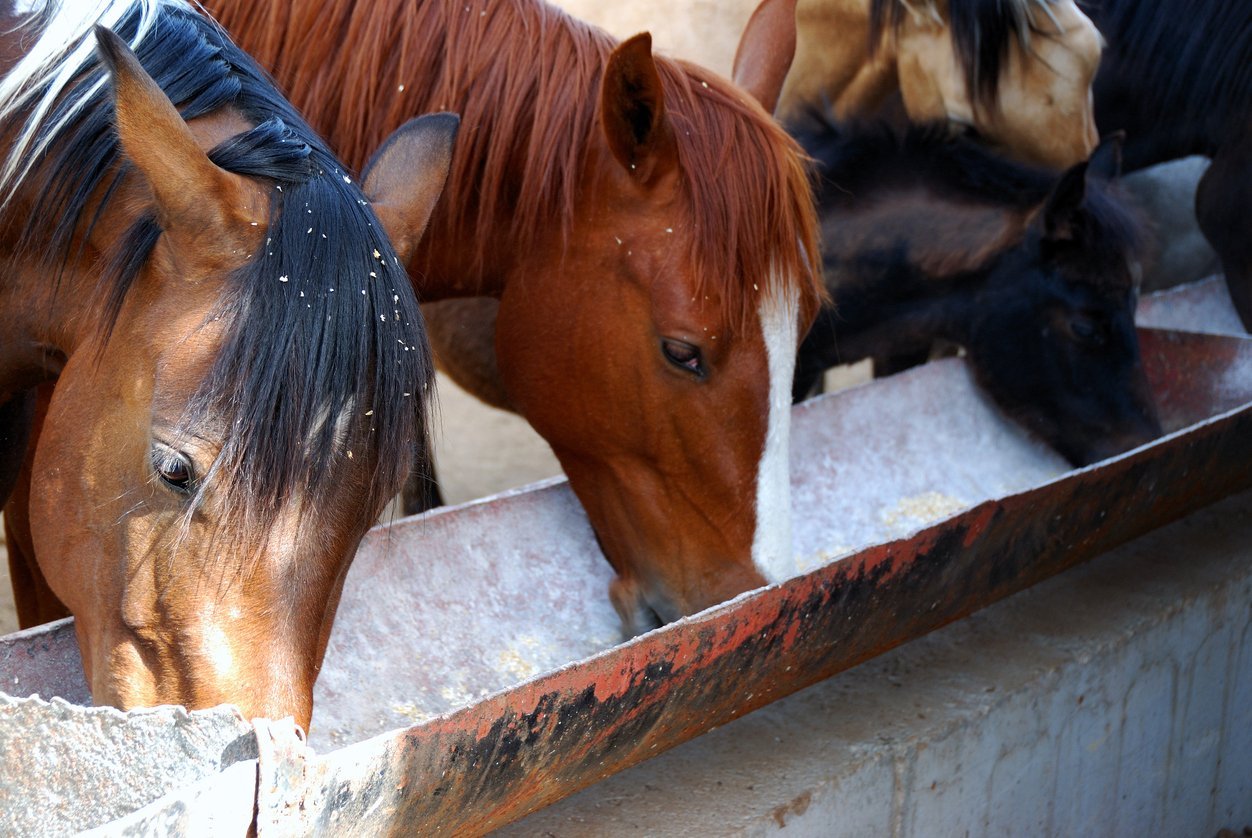
Now you know how important hyaluronic acid is to maintaining your horse’s joint health.
From lubricating joints to neutralizing free radicals, hyaluronic acid for horses isn’t something you want to ignore when it comes to maximizing your horse’s well-being.
But the good news is that it’s easy to provide your horse with hyaluronic acid.
This naturally occurring substance is readily available in a wide variety of supplements, some of which we discussed above.
And we happen to make a great option. TRI-ACTA H.A. contains all-active ingredients and 145 mg of hyaluronic acid for horses in every serving.
So you can rest easy knowing your equine friend has everything he needs to stay in tip-top shape.
Have more questions? Don’t hesitate to reach out to our team.
TRI-ACTA H.A. for Equine
Our maximum strength formula is perfect for horses that are ageing, experiencing arthritis and stiffness, are in training and competition, or under a heavy workload.
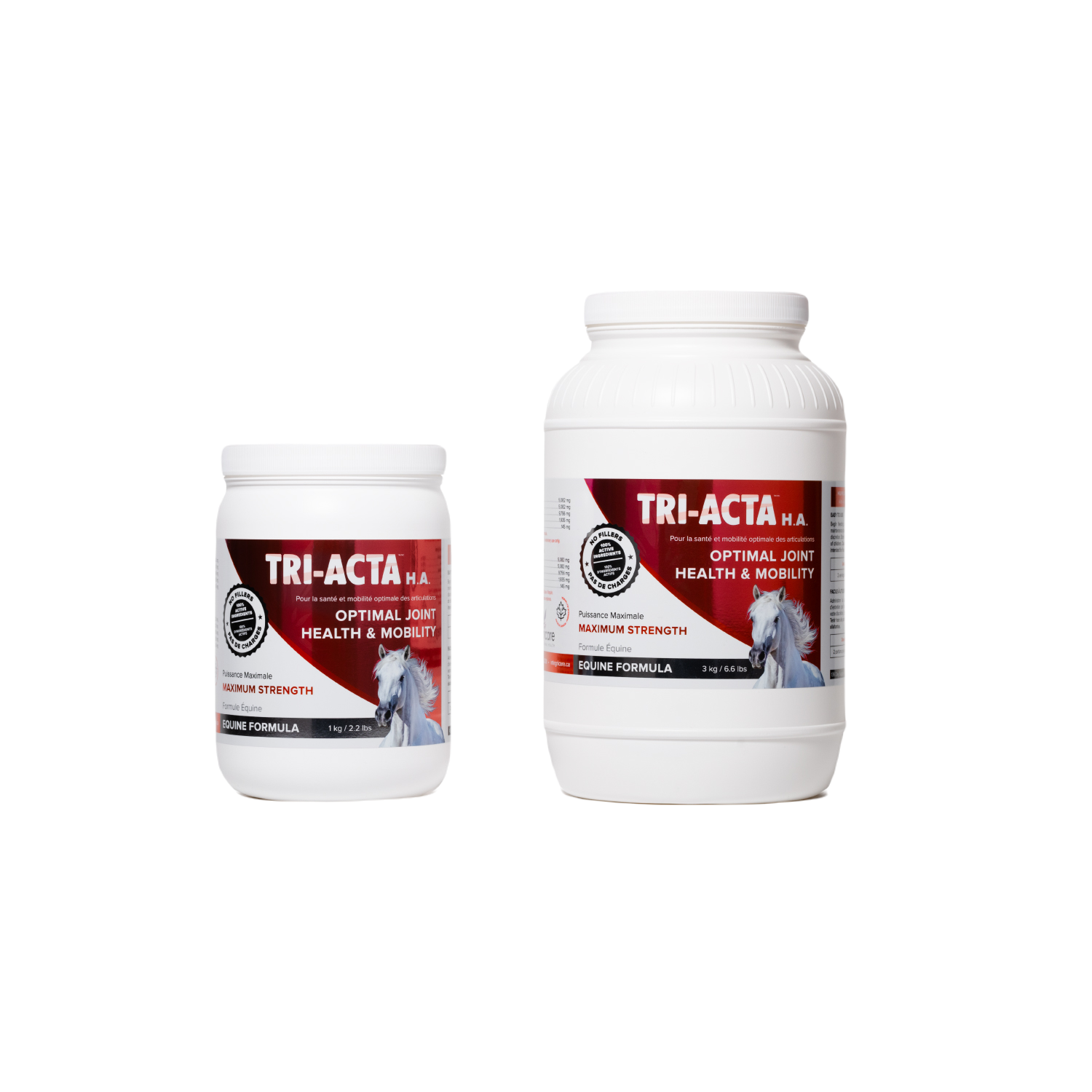
Newsletter Signup
Subscribe to our newsletter to receive the latest news and exclusive offers.
.jpg?height=2000&name=Cliick_Integricare-DISPLAY-REVISEDV2%20(1).jpg)
Proactive & Therapeutic Joint Supplements
When given daily, Integricare joint supplements recover bone and joint injuries faster and help prevent mobility injuries from happening in the first place.

